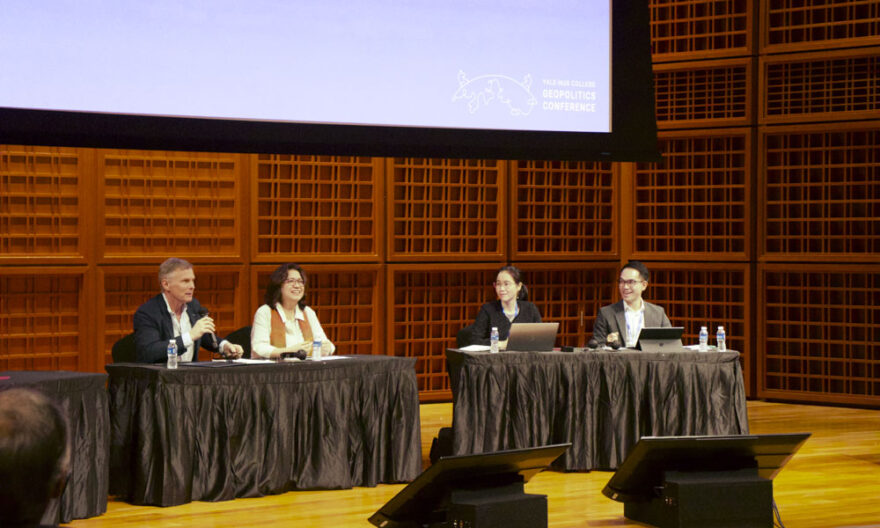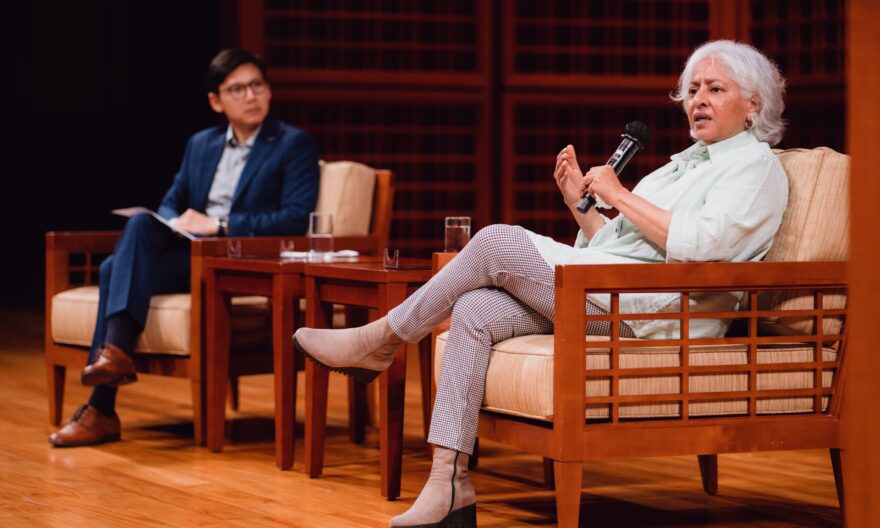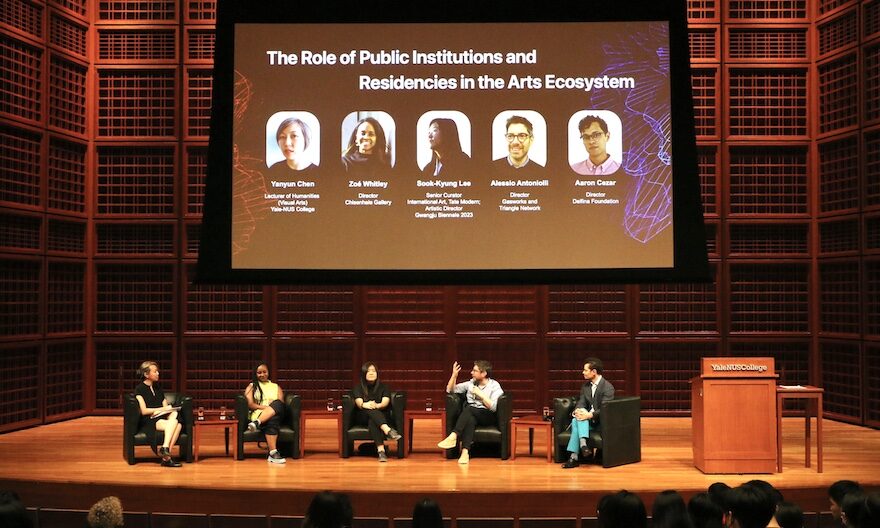Yale-NUS College hosts journalist panel on US-China relations
Esteemed journalists share their perspectives on media reporting of US-China issues
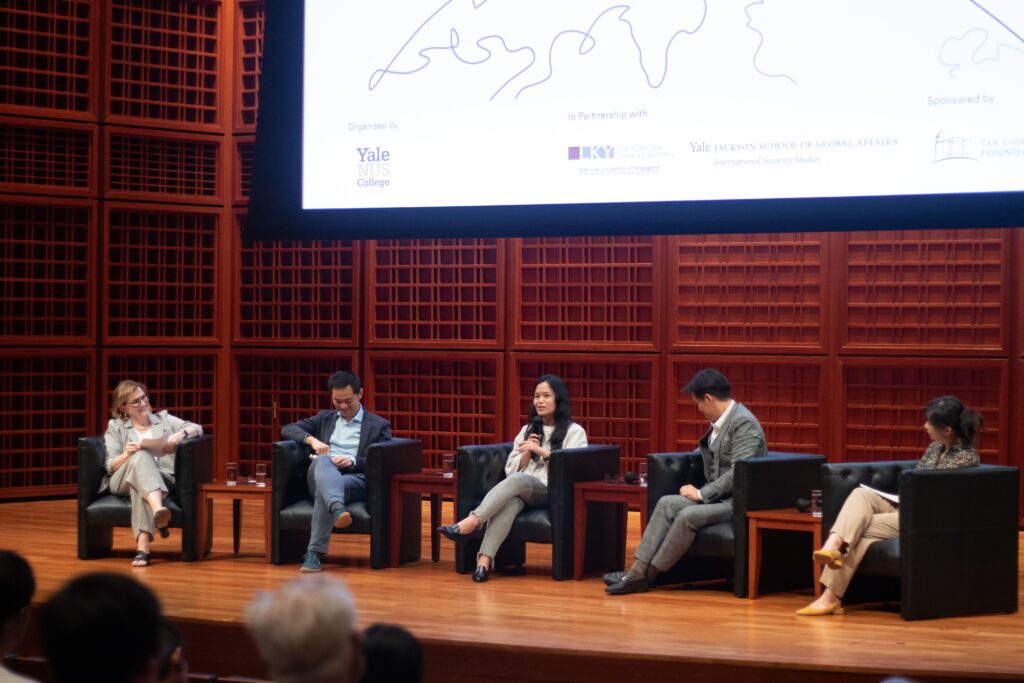
The speakers at the event (from left to right): Vice President (Engagement) Trisha Craig, Mr Vincent Ni (former China Affairs correspondent at the Guardian), Ms Silva Shih (Managing Editor at CommonWealth Magazine), Mr Ken Moriyasu (Diplomatic correspondent at Nikkei Asia), and Ms Sha Hua (Reporter for China at The Wall-Street Journal). Image by Rachel Tey for Yale-NUS College.
On 29 September 2022, Yale-NUS College hosted a Geopolitics Series event titled “Global Posturing, Domestic Pressures: Media Narratives of US-China Tensions” in partnership with the Lee Kuan Yew School of Public Policy and Yale Jackson School of Global Affairs. The event, made possible by sponsorship from the Tan Chin Tuan Foundation, is part of a series of public and private conversations to address the overarching issues of how nations conduct their foreign, economic and trade policies in the new era of great power competition.
Leading journalists from publications across Asia and the West discussed media coverage of US-China tensions, and especially how media coverage revealed domestic political worries and shaped public opinion of the nations.
During the event, the speakers discussed changes in the coverage of US-China relations in recent years. Mr Vincent Ni, former China Affairs correspondent at The Guardian, observed that the tone used to report on US-China relationship has become more alarmist, negative, and pessimistic. But in recent years we have also seen a more diverse perspective being presented in international press, for example the view from Singapore, Mr Ni observed. “In a way, this reflects the real complexity of today’s great power competition between China and the US. We also need to pay attention to how countries caught up in the middle hedge.”
The panelists discussed how reporting of US-China tensions influenced public opinion of the two nations worldwide. Ms Silva Shih, the managing editor of CommonWealth Magazine, shared that the inability to travel to China has made it much more difficult for journalists to understand and report on local perspectives. For example, while reporters wrote about COVID-19 developments in China, it was often difficult for them to access and report on how local people felt.
During the panel, the speakers explored how reporters should navigate and report on international geopolitical issues while bringing domestic voices into the conversation. Ms Sha Hua, a reporter for China in The Wall Street Journal, added that bringing perspectives from the ground is necessary to go beyond simplistic framing of global events. This is especially so since many people around the world do not have a good understanding of China, and might even have biases against it. Through better reporting, she hoped that people can understand other parts of Chinese culture and gain a more nuanced perspective on global affairs.
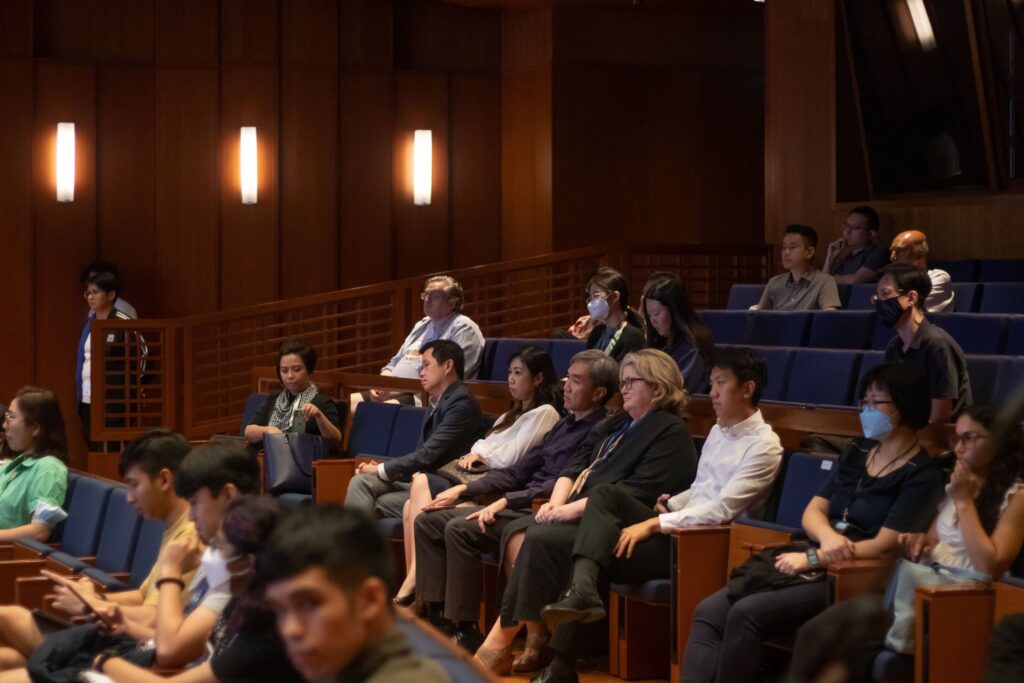
The expert panel answered questions from the in-person and online audiences. Image by Rachel Tey for Yale-NUS College.
During the question and answer session, an audience member brought up the problem of information credibility in the age of social media. Mr Ni acknowledged that verifying information on social media is a big challenge for both journalists and social media users given the proliferation of fake news. As such, Ms Sha recommended how readers should pay attention to language and how quotes are made in order to sift out uncredible content.
The panel discussion was moderated by Vice President (Engagement) Trisha Craig, who concluded the session with a reflection that the media has incredible importance in helping people around the world understand global issues. She also underlined the usefulness of the panelists’ recommendations on being critical about consuming information one encounters.
Joshua Vargas (Class of 2023) shared how he attended the event as he wanted to learn about how journalists engage with issues of neutrality, access, and communication of complicated truths in today’s world.
“Great power conflicts are nothing new in world history, but our experience of them is heightened by the information overload of today’s world. Sifting through all of that – first-hand accounts and viral tweets – makes us more informed than ever, yet I feel more vulnerable than ever to influence and disinformation! In addition, more and more ordinary citizens care about the implications of issues like US-China tensions on our lives,” Joshua shared.
“As such, I feel that these journalists have heavy responsibility and occupy an important role in combating disinformation in our world today.”
The Tan Chin Tuan Foundation is a founding benefactor of the College. The Foundation strives to support causes and projects that are viable, sustainable and well-managed with definable social outcomes. Besides the Tan Chin Tuan Geopolitics Series which brings together globally and regionally renowned scholars and practitioners to offer insights on the changing global order, the Foundation also supports the College through the Tan Chin Tuan Chinese Culture and Civilisation Programme, which aims to increase the understanding of China and Chinese culture among the community. The Programme also supports the Tan Chin Tuan Professorship in Chinese Studies, of which Professor of Humanities (Chinese Studies) Scott Cook is the inaugural recipient, the Chinese Language Scholarship, academic conferences as well as other co-curricular activities at Yale-NUS

